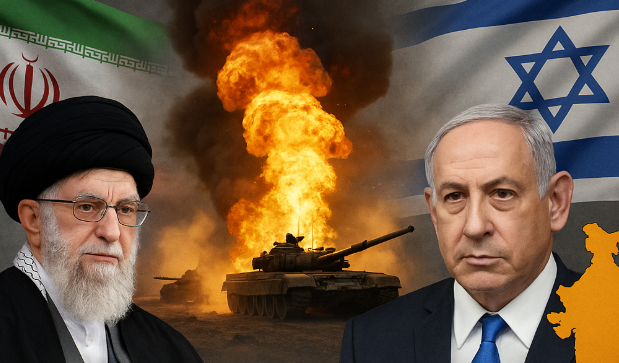
The world is currently standing on the edge of a serious crisis that threatens to directly affect your wallet. The ongoing war between Iran and Israel has sent shockwaves through the global oil market. In just 24 hours, crude oil prices have witnessed their steepest surge in the last three years. As missiles rain down and guns roar across battlefields, the impact is not limited to the war zones — it is being felt at fuel stations worldwide.
The big question remains: Will this war drain your savings? Are petrol and diesel prices in India about to hit new record highs? And if this war drags on, how severely will it burden India’s economy? Let’s analyze this crisis in depth and understand how the world is burning in the flames of oil and how India stands on the brink of a major financial challenge.
The escalating conflict between Iran and Israel recently triggered the sharpest one-day increase in crude oil prices in three years. As both nations continue to exchange missile attacks, there seems to be no immediate hope for de-escalation. This rapid increase in oil prices has created a severe crisis for not only India but for many countries worldwide. To better understand the depth of this crisis and its potential future implications, let’s break it down into five key points:
1. Decline in Shipments
Iran contributes roughly 2% to the global crude oil demand. Around 90% of its oil exports are dispatched from Kharg Island. Satellite imagery indicates a significant drop in shipments, and Iran has even evacuated the perimeter of the Kharg Island terminal. However, the Hormuz Strait remains operational, from where nearly 20% of global oil shipments pass. Under increased American pressure, Israel could push to halt Iran's oil supply altogether. Moreover, key oil production facilities of other Gulf producers remain within Iran’s missile strike range, and any attack on these could severely disrupt supply lines. If supply chains are further disrupted, oil prices could spike sharply, affecting countries like India that rely heavily on imported oil.
2. Reliance on Saudi Arabia and UAE
Should Iran’s oil supply be cut off, the global dependence on Saudi Arabia and the UAE will increase drastically. Estimates suggest that these countries might be able to ramp up production by 3 to 4 million barrels per day to compensate for lost Iranian supply. Saudi Arabia, a leading global oil producer, had an oil output of 12.7 million barrels per day in 2024. It also possesses the second-largest oil reserves in the world, holding over 267 billion barrels. However, even their capacity to fill the gap has its limits in the face of a full-scale crisis.
3. Full-Scale War and the Strait of Hormuz Threat
If the conflict escalates into a full-blown war, Iran could move to close the Strait of Hormuz. This narrow chokepoint is critical, with approximately 20% of global natural gas and one-third of global oil passing through it. Any disruption here could cause crude oil prices to jump by as much as 20%. According to credit rating agency ICRA, nearly 45% to 50% of India’s crude oil imports come through this route, from Iraq, Saudi Arabia, Kuwait, and the UAE. A blockade would place India in an extremely precarious position, severely impacting its energy security.
4. Direct Impact on India’s Economy
India imports 85% to 88% of its crude oil requirements. In 2023-2024, the country’s major suppliers were Iraq, Saudi Arabia, Russia, and the UAE. ICRA has warned that any disruption in oil and gas shipments through the Strait of Hormuz could deal a significant blow to India’s economy. A supply shock would drive up India’s oil import bill and widen its current account deficit. Additionally, it may dampen private sector investment as energy costs surge. ICRA estimates that even a $10 per barrel increase in crude prices could raise India’s oil import bill by $13 to $14 billion. This would strain government finances and trickle down to consumers through higher fuel and commodity prices.
5. The Broader Economic Domino Effect
The consequences of this conflict are not limited to oil alone. Should the situation worsen, its ripple effects would extend to gas prices, stock markets, inflation, employment, and everyday living costs. For India, a country that heavily depends on imported oil, this war represents a multi-layered threat. Every $10 rise in oil prices will not only increase the import bill by billions but will also lead to increased pressure on the government to manage inflation, potentially resulting in higher fuel prices for the public. Ultimately, this war's impact could extend from global borders directly into household budgets, pushing up the cost of everything from transportation to daily essentials.
As the conflict continues to intensify, the world watches anxiously, hoping that global powers can intervene and defuse the situation. If not, this war may not just remain a battle between Iran and Israel—it may end up burning the pockets of people across the globe.
Disclaimer:
The information presented in this article is for informational and educational purposes only. The analysis is based on current events, publicly available data, and expert opinions at the time of writing. Geopolitical situations are dynamic and may change rapidly. Readers are advised to consult financial experts or authoritative sources before making any financial or investment decisions based on the content of this article. The author and the website do not take responsibility for any loss or damage resulting from reliance on the information provided herein.




